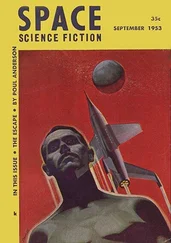What I need is sleep, Baynes thought. A night’s rest. Or is it that I’m not facing the situation? Shrinking, because it is hard.
When Mr. Tagomi returned—carrying a glass of water and some sort of pill—Mr. Baynes said, “I really am going to have to say good night and get to my hotel room. But I want to find out something first. We can discuss it further tomorrow, if that’s convenient with you. Have you been told about a third party who is to join us in our discussions?”
Mr. Tagomi’s face registered surprise for an instant; then the surprise vanished and he assumed a careless expression. “There was nothing said to that effect. However—it is interesting, of course.”
“From the Home Islands.”
“Ah,” Mr. Tagomi said. And this time the surprise did not appear at all. It was totally controlled.
“An elderly retired businessman,” Mr. Baynes said. “Who is journeying by ship. He has been on his way for two weeks, now. He has a prejudice against air travel.”
“The quaint elderly,” Mr. Tagomi said.
“His interests keep him informed as to the Home Islands markets. He will be able to give us information, and he was coming to San Francisco for a vacation in any case. It is not terribly important. But it will make our talks more accurate.”
“Yes,” Mr. Tagomi said. “He can correct errors regarding home market. I have been away two years.”
“Did you want to give me that pill?”
Starting, Mr. Tagomi glanced down, saw that he still held the pill and water. “Excuse me. This is powerful. Called zaracaine. Manufactured by drug firm in District of China.” As he held his palm out, he added, “Non-habit-forming.”
“This old person,” Mr. Baynes said as he prepared to take the pill, “will probably contact your Trade Mission direct. I will write down his name so that your people will know not to turn him away. I have not met him, but I understand he’s a little deaf and a little eccentric. We want to be sure he doesn’t become—miffed.” Mr. Tagomi seemed to understand. “He loves rhododendrons. He’ll be happy if you can provide someone to talk to him about them for half an hour or so, while we arrange our meeting. His name, I will write it down.”
Taking his pill, he got out his pen and wrote.
“Mr. Shinjiro Yatabe,” Mr. Tagomi read, accepting the slip of paper. He dutifully put it away in his pocketbook.
“One more point.”
Mr. Tagomi slowly picked at the rim of his cup, listening.
“A delicate trifle. The old gentleman—it is embarrassing. He is almost eighty. Some of his ventures, toward the end of his career, were not successful. Do you see?”
“He is not well-off any longer,” Mr. Tagomi said. “And perhaps he draws a pension.”
“That is it. And the pension is painfully small. He therefore augments it by means here and there.”
“A violation of some petty ordinance,” Mr. Tagomi said. “The Home Government and its bureaucratic officialdom. I grasp the situation. The old gentleman receives a stipend for his consultation with us, and he does not report it to his Pension Board. So we must not reveal his visit. They are only aware that he takes a vacation.”
“You are a sophisticate,” Mr. Baynes said.
Mr. Tagomi said, “This situation has occurred before. We have not in our society solved the problem of the aged, more of which persons occur constantly as medical measures improve. China teaches us rightly to honor the old. However, the Germans cause our neglect to seem close to outright virtue. I understand they murder the old.”
“The Germans,” Baynes murmured, again rubbing his forehead. Had the pill had an effect? He felt a little drowsy.
“Being from Scandinavia, you no doubt have had much contact with the Festung Europa. For instance, you embarked at Tempelhof. Can one take an attitude like this? You are a neutral. Give me your opinion, if you will.”
“I don’t understand what attitude you mean,” Mr. Baynes said.
“Toward the old, the sick, the feeble, the insane, the useless in all variations. ‘Of what use is a newborn baby?’ some Anglo-Saxon philosopher reputedly asked. I have committed that utterance to memory and contemplated it many times. Sir, there is no use. In general.”
Mr. Baynes murmured some sound or other; he made it the noise of noncommittal politeness.
“Isn’t it true,” Mr. Tagomi said, “that no man should be the instrument for another’s needs?” He leaned forward urgently. “Please give me your neutral Scandinavian opinion.”
“I don’t know,” Mr. Baynes said.
“During the war,” Mr. Tagomi said, “I held minor post in District of China. In Shanghai. There, at Hongkew, a settlement of Jews, interned by Imperial Government for duration. Kept alive by JOINT relief. The Nazi minister at Shanghai requested we massacre the Jews. I recall my superiors’ answer. It was, ‘Such is not in accord with humanitarian considerations.’ They rejected the request as barbaric. It impressed me.”
“I see,” Mr. Baynes murmured. Is he trying to draw me out? he asked himself. Now he felt alert. His wits seemed to come together.
“The Jews,” Mr. Tagomi said, “were described always by the Nazis as Asian and non-white. Sir, the implication was never lost on personages in Japan, even among the War Cabinet. I have not ever discussed this with Reich citizens whom I have encountered—”
Mr. Baynes interrupted, “Well, I’m not a German. So I can hardly speak for Germany.” Standing, he moved toward the door. “I will resume the discussion with you tomorrow. Please excuse me. I cannot think.” But, as a matter of fact, his thoughts were now completely clear. I have to get out of here, he realized. This man is pushing me too far.
“Forgive stupidity of fanaticism,” Mr. Tagomi said, at once moving to open the door. “Philosophical involvement blinded me to authentic human fact. Here.” He called something in Japanese, and the front door opened. A young Japanese appeared, bowing slightly, glancing at Mr. Baynes.
My driver, Mr. Baynes thought.
Perhaps my quixotic remarks on the Lufthansa flight, he thought suddenly. To that—whatever his name was. Lotze. Got back to the Japanese here, somehow. Some connection.
I wish I hadn’t said that to Lotze, he thought. I regret. But it’s too late.
I am not the right person. Not at all. Not for this.
But then he thought. A Swede would say that to Lotze. It is all right. Nothing has gone wrong; I am being overly scrupulous. Carrying the habits of the previous situation into this. Actually I can do a good deal of open talking. That is the fact I have to adapt to.
And yet, his conditioning was absolutely against it. The blood in his veins. His bones, his organs, rebelled. Open your mouth, he said to himself. Something. Anything. An opinion. You must, if you are to succeed.
He said, “Perhaps they are driven by some desperate subconscious archetype, in the Jungian sense.”
Mr. Tagomi nodded. “I have read Jung. I understand.”
They shook hands. “I’ll telephone you tomorrow morning,” Mr. Baynes said. “Good night, sir.” He bowed, and so did Mr. Tagomi.
The young smiling Japanese, stepping forward, said something to Mr. Baynes which he could not understand.
“Eh?” Baynes said, as he gathered up his overcoat and stepped out onto the porch.
Mr. Tagomi said, “He is addressing you in Swedish, sir. He has taken a course at Tokyo University on the Thirty Years’ War, and is fascinated by your great hero, Gustavus Adolphus.” Mr. Tagomi smiled sympathetically. “However, it is plain that his attempts to master so alien a linguistic have been hopeless. No doubt he uses one of those phonograph record courses; he is a student, and such courses, being cheap, are quite popular with students.”
Читать дальше










